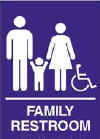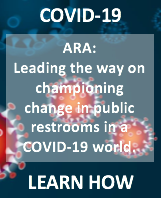Family and Unisex Restrooms
Overview
ADA Accessible single-stall restrooms are important for visitors with visible and non-visible disabilities, or with other words for people living with “special needs”. These restrooms allow people with special needs to visit museums, parks, theaters, libraries and other public places. Family style, unisex, or single-user restrooms (often called handicapped restrooms) offer flexibility: males or females, and one or more individuals (i.e. family members), of the same or opposite sex, can use them. They can also provide such amenities as two toilets, one for adults and one for children, and a changing table. People with visible physical disabilities are not the only users of single-stall handicapped washrooms. The single-stall washroom (whether it is called family style or handicapped washroom) provides a higher level of privacy than the multi-stall public restrooms and it provides a solution for people with shy-bladder and those in the transgendered community. In addition, people using an ostomy pouch often prefer the additional access space and increased privacy of a unisex restroom.
Problems Not Addressed by ADA
Sometimes a key is required to open the single-stall restroom, so the user has to find the person in charge with the key. If the restroom is marked as a handicapped washroom and the person requesting the key has special needs, but in the form of a non-visible handicap, the person in charge of the key can make the situation very uncomfortable by asking for justification; and therefore we recommend an unlocked special needs facility policy with a sign preventing misuse (please see details under Recommendations).
Long waiting can occur if only a single-stall restroom is available without having a multi-stall washroom by its side.
Who Can Benefit
- Wheelchair users
- People who need assistance when using the washroom
- People living with ostomy
- Paruretics (Shy-Bladder or Bashful Bladder Syndrome)
- Parents with children of the opposite sex
- All users by having an additional option to use a toilet (i.e. while the multi-stall restroom is getting cleaned)
Transgendered Persons (see NY lawsuit in column 2) - Vision Impaired
Recommendations
A properly signed single user family restroom should be included with separate gender multi-stall toilet facilities.
The symbol or sign on the door should indicate family, handicap as well as single user availability for those with special needs.
We promote the unlocked with a sign preventing misuse. A special needs statement would make it clear that the facility is not for the general public, but for those with special needs.
We recommend the use of the following statement:
“This restroom is intended only for those with special needs”,
or simply
“Special Needs Washroom”
If locking the special needs facility is unavoidable, we recommend instructing the security personal to hand over the key without asking for justification.
Our intent is also to raise awareness that the term “special needs” can be associated with a wide variety of conditions.
Braille inscriptions enable vision-impaired people to locate public toilets and the various fixtures with the facilities.
Exceptions from the Media
When Imperatives Collide: Handicap Bathrooms
 If you’ve ever wondered whether it’s okay to use stalls designated for handicapped patrons in a public bathroom …All Things Considered, 1/22/06 …Fathers are in a terrible spot when it comes to using public restrooms with young daughters. I’ve noticed that more institutions are responding to this by installing “family” bathrooms, in addition to men’s and women’s rooms …
If you’ve ever wondered whether it’s okay to use stalls designated for handicapped patrons in a public bathroom …All Things Considered, 1/22/06 …Fathers are in a terrible spot when it comes to using public restrooms with young daughters. I’ve noticed that more institutions are responding to this by installing “family” bathrooms, in addition to men’s and women’s rooms …
 “Ask Amy” syndicated columnist Amy Dickinson Chicago Tribune 9/25/’05
“Ask Amy” syndicated columnist Amy Dickinson Chicago Tribune 9/25/’05
….Since then, he’s coped with obstacles such as requiring his wife’s help for simple tasks like using a restroom. Because family restrooms aren’t available, his wife guides his wheelchair into the women’s restroom. “It’s a little uncomfortable but I can’t help it,” she explained. “I have to do things he needs done.”
Murfreesboro TN Post 7/30/07
Family, unisex, or single-user restrooms … …offer flexibility: males or females can use them, and one or more individuals, of the same or opposite sex, can use them. Examples are a caregiver and child, and a person with a disability, alone or with assistance.
Assoc. Science-Technology Centers – Accessible Practices Exchange June ’03
Florida Sun-Sentinel M.S. Bingham 10/16/05
NY (AP) Transgender people won the right to use any restroom operated by the Metropolitan
Transportation Authority after a lawsuit …
Associated Press ‘MTA settles case…’ 10/24/06
MICH – Detroit Free Press ‘World Series notebook – Potty parity at Busch’ 10/27/06
Contact Us
American Restroom Association, Inc.
P.O. Box 21237
Catonsville, MD 21228

MEDIA: Let us connect you with the best expert to support your news and media projects.
INVENTORS, MANUFACTURERS, SUPPLIERS, & SERVICE PROVIDERS: We want to hear your stories about how you are leading change in restroom design and maintenance!


